British Columbia Sawmill Focuses On High Demand Wood Products
By Tony Kryzanowski, Wood-Mizer Contributing Author
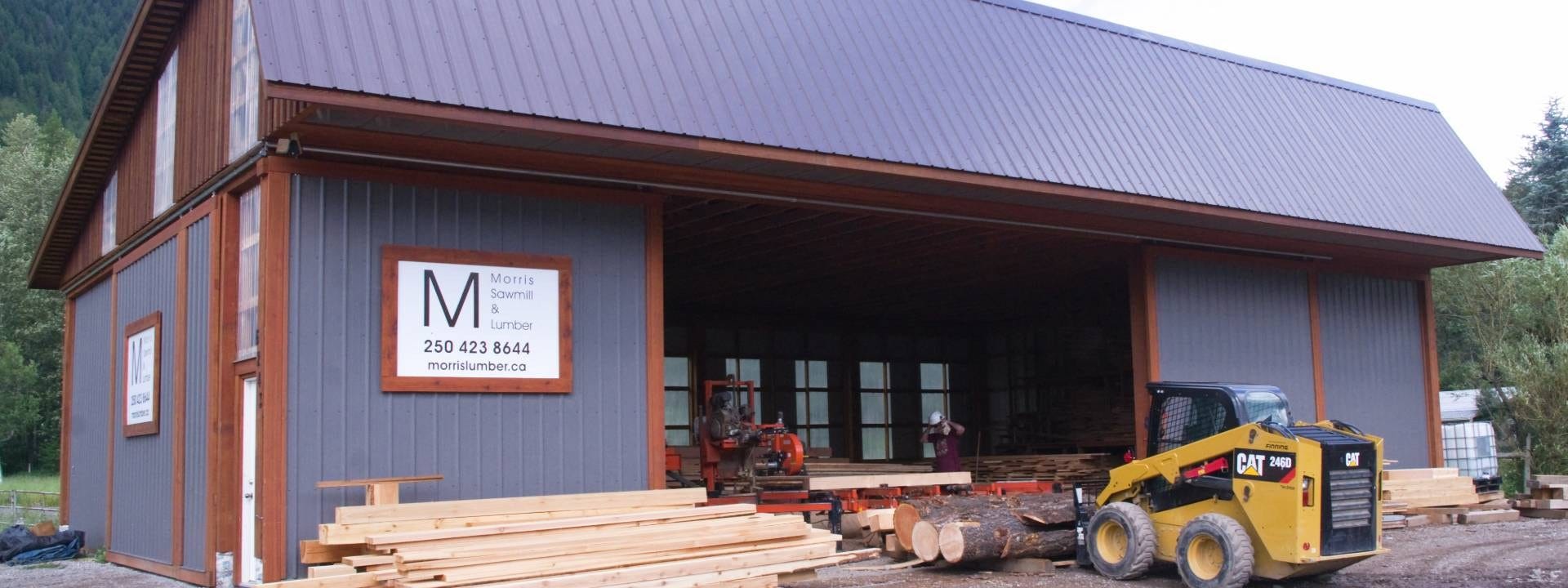
Travel through any ski resort town in the British Columbia Interior, and what's evident are the number of homes and businesses featuring a significant amount of wood building products used in both structural and design applications.
Fernie, British Columbia is part of an area that is world renowned as a recreational skiing destination. So there is a considerable amount of post and beam building construction and a demand for a variety of wood products for decks and fences.
Demand for custom sawmilling within this environment is high. That is the opportunity that sawmiller, Nick Morris, recognized when his hometown of Fernie began experiencing significant growth with people building second homes to take advantage of the high-quality skiing destination. Mountain biking and fly fishing have also grown as popular summer attractions, making the community more of a year-round vacation spot.
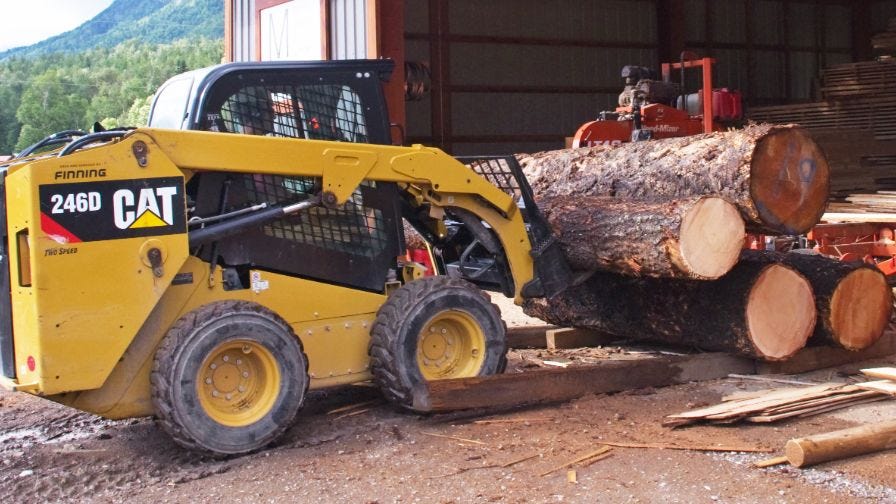

"Being from a little ski town, I noticed a lot of the big homes being constructed and they need the type of wood products that I am able to manufacture," Nick says about his motivation for starting his custom sawmilling venture. Nick owns Morris Sawmill and Lumber, located about five kilometres west of Fernie. The sawmill, featuring a Wood-Mizer LT40 Hydraulic bandsaw mill as the backbone of the business has been at its current location for more than 25 years.
While his family roots are in the resource sector, Nick says he's the first family member who has leaned toward forestry. He enjoys being outdoors and manufacturing wood products, although this is not his only interest. In winter, he works as a heli-ski guide, so he only operates his sawmilling business from April to November.
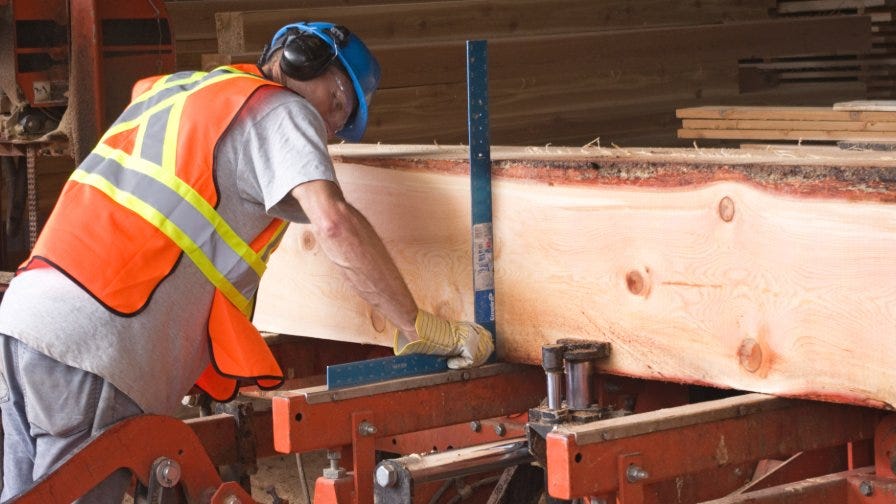

"I sure like this job," Nick says. "I have some freedom where I am the boss so I can go fishing and hunting whenever I feel like it. The skiing is a nice change. I think it would be difficult to log here in the winter time because we get a lot of snow and its challenging to saw logs that are first wet and then frozen."
Nick adds that business is good and he is very satisfied with how it balances well with his other interests. "I shoot for quality and not necessarily volume," he says. "That seems to get people to call back."
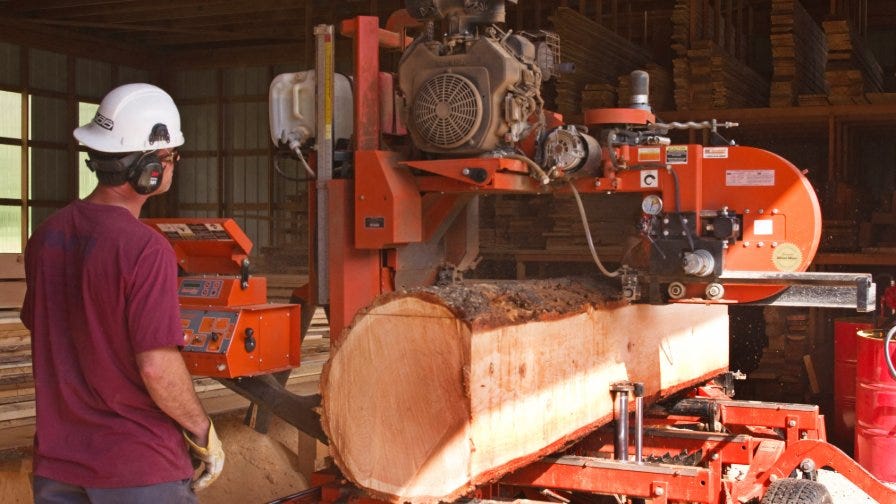

Given Fernie's location, Nick benefits from an area that offers high quality and large diameter timber resources in close proximity, featuring such valuable species as douglas fir and western red cedar. These work well and are in high demand in timber frame construction. Occasionally, he will also score some rare and highly valued western larch, which tends to grow in pockets in that part of southeastern British Columbia.
Over the years, he has established supply agreements with a number of private landowners and with local area sawmills for oversized logs. His main source for cedar are logs rejected as telephone poles. He prefers long length douglas fir logs, but finds that they are becoming harder to find. Orders range from a few boards and timbers to large, multi-dimensional wood packages, depending on the size and demands of a construction project.
The building that houses Morris Sawmill and Lumber is modern and well designed, with plenty of space for both the bandsaw mill and indoor storage to maintain a well-sorted lumber inventory of some of their most popular products. He manufactured most of the wood for the building and erected it with the help of some friends. It's obvious that he has learned some valuable lessons over the years about the importance of maintaining an inventory and filling it with the types of products in highest demand. The ability to pull from inventory also allows him more pricing flexibility.
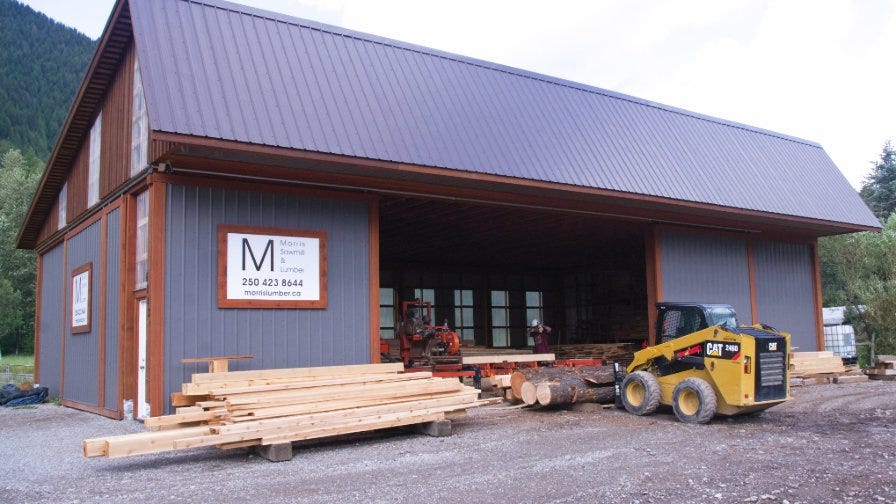

"My building is a bit bigger now and so I am able to stock a bit more material, which allows me to fill an order a lot quicker," Nick says. "So to fill an order, maybe I only need to saw some beams because I may already have all the boards waiting in inventory."
Nick recently purchased his new Wood-Mizer LT40 Hydraulic portable sawmill. It is equipped with hydraulic log loading and handling features as well as a log debarker. Morris Sawmill and Lumber offers a wide range of both timbers and lumber. Douglas fir timbers can be as large as 8" x 12".
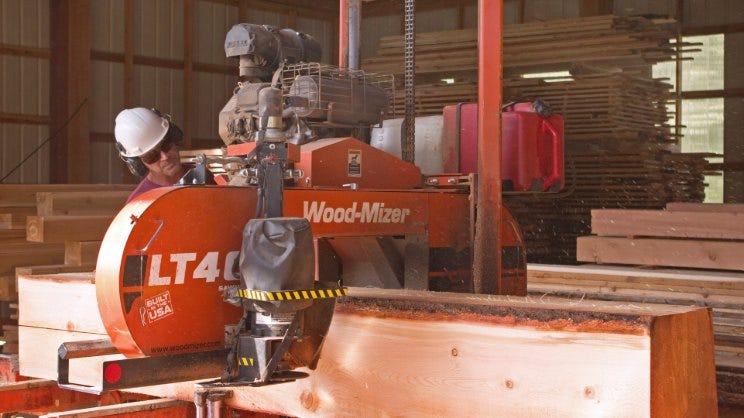

The bandsaw mill can saw logs up to 36" in diameter and up to 21' in length. With the ability to saw products up to that length, Nick likes to start with longer logs in the yard that he can then carefully buck with the goal of efficiently removing defects and producing wood products in a variety of popular lengths up to 16' and even longer as required.
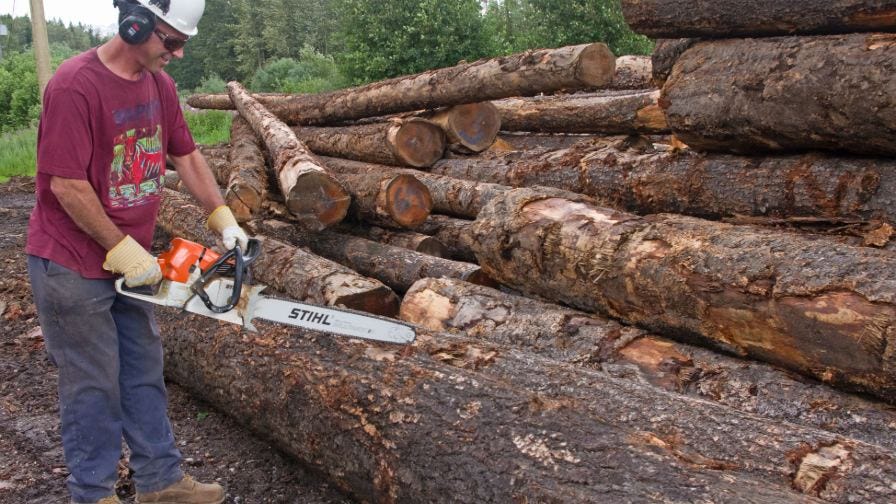

Cedar timbers are available in sizes as large at 8" x 8" or as small as 4" x 4", which are popular for fence posts and railing, given cedar's natural resistance to moisture. Other outdoor applications for rough cedar wood products includes siding, fascia and decking. "Actually in its rough form, the cedar stands up better in the sun and accepts more stain," says Nick.
Overall, he focuses on common timber and lumber dimensions that are ready to use because these products move the fastest from inventory. Nick says that his LT40 Hydraulic portable sawmill is ideal for his type of business. "A bandsaw mill is the best tool for this type of business because you can just slice and dice whatever you want out of big timbers," says Nick. He aims to produce about 1,000 board feet per day, but it all depends on orders. He can fill an order within a week or less. Typically, he will saw timbers on a just-in-time basis to maintain their quality and use sideboards to fill his inventory.
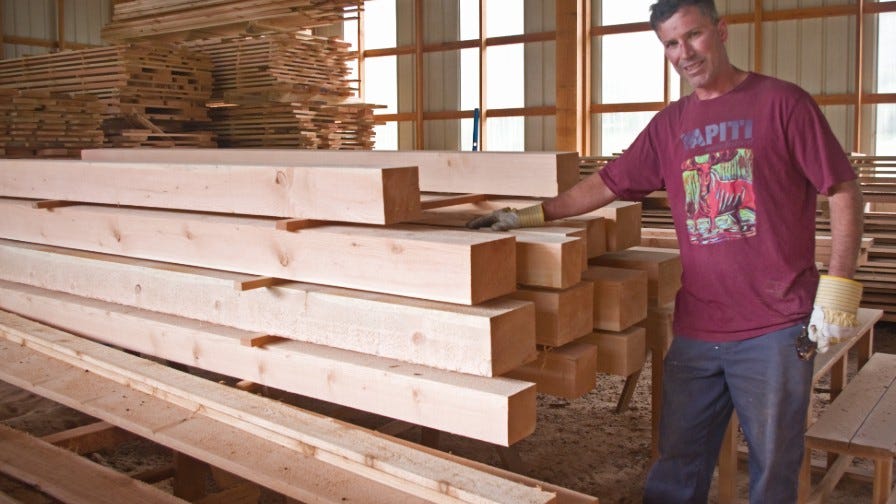

This particular bandsaw mill comes equipped with a number of features to assist with log management and sawing accuracy. "This sawmill has the Accuset system so when I cut my boards, I can program it and just let it work," says Nick. This feature is an upgrade from his previous Wood-Mizer and he says that it was really easy to learn. "All those sideboards that I saw from my beams are super accurate and high quality material," he says.
Nick uses the standard Wood-Mizer sawmill blade that comes with the bandsaw mill, which is with a 1/8" kerf. Generally, he's careful with how long he uses sawmill blades before sharpening and setting them again on his automated Wood-Mizer sawmill blade sharpening system, typically changing a blade every hour. He uses up to seven sawmill blades a day during a full day of production. Given his experience using the Wood-Mizer sawmill, he can sense when a blade is struggling to perform at optimum. It takes him about a half hour to sharpen and set seven sawmill blades.
Nick says that he is pleased with the performance of his Wood-Mizer portable sawmill, and that it was an easy transition from his old model to his new one. Parts supply and sales support is handy from the Wood-Mizer dealer located in Salmon Arm, British Columbia.
Travel through any ski resort town in the British Columbia Interior, and what's evident are the number of homes and businesses featuring a significant amount of wood building products used in both structural and design applications.
Fernie, British Columbia is part of an area that is world renowned as a recreational skiing destination. So there is a considerable amount of post and beam building construction and a demand for a variety of wood products for decks and fences.
Demand for custom sawmilling within this environment is high. That is the opportunity that sawmiller, Nick Morris, recognized when his hometown of Fernie began experiencing significant growth with people building second homes to take advantage of the high-quality skiing destination. Mountain biking and fly fishing have also grown as popular summer attractions, making the community more of a year-round vacation spot.

"Being from a little ski town, I noticed a lot of the big homes being constructed and they need the type of wood products that I am able to manufacture," Nick says about his motivation for starting his custom sawmilling venture. Nick owns Morris Sawmill and Lumber, located about five kilometres west of Fernie. The sawmill, featuring a Wood-Mizer LT40 Hydraulic bandsaw mill as the backbone of the business has been at its current location for more than 25 years.
While his family roots are in the resource sector, Nick says he's the first family member who has leaned toward forestry. He enjoys being outdoors and manufacturing wood products, although this is not his only interest. In winter, he works as a heli-ski guide, so he only operates his sawmilling business from April to November.

"I sure like this job," Nick says. "I have some freedom where I am the boss so I can go fishing and hunting whenever I feel like it. The skiing is a nice change. I think it would be difficult to log here in the winter time because we get a lot of snow and its challenging to saw logs that are first wet and then frozen."
Nick adds that business is good and he is very satisfied with how it balances well with his other interests. "I shoot for quality and not necessarily volume," he says. "That seems to get people to call back."

Given Fernie's location, Nick benefits from an area that offers high quality and large diameter timber resources in close proximity, featuring such valuable species as douglas fir and western red cedar. These work well and are in high demand in timber frame construction. Occasionally, he will also score some rare and highly valued western larch, which tends to grow in pockets in that part of southeastern British Columbia.
Over the years, he has established supply agreements with a number of private landowners and with local area sawmills for oversized logs. His main source for cedar are logs rejected as telephone poles. He prefers long length douglas fir logs, but finds that they are becoming harder to find. Orders range from a few boards and timbers to large, multi-dimensional wood packages, depending on the size and demands of a construction project.
The building that houses Morris Sawmill and Lumber is modern and well designed, with plenty of space for both the bandsaw mill and indoor storage to maintain a well-sorted lumber inventory of some of their most popular products. He manufactured most of the wood for the building and erected it with the help of some friends. It's obvious that he has learned some valuable lessons over the years about the importance of maintaining an inventory and filling it with the types of products in highest demand. The ability to pull from inventory also allows him more pricing flexibility.

"My building is a bit bigger now and so I am able to stock a bit more material, which allows me to fill an order a lot quicker," Nick says. "So to fill an order, maybe I only need to saw some beams because I may already have all the boards waiting in inventory."
Nick recently purchased his new Wood-Mizer LT40 Hydraulic portable sawmill. It is equipped with hydraulic log loading and handling features as well as a log debarker. Morris Sawmill and Lumber offers a wide range of both timbers and lumber. Douglas fir timbers can be as large as 8" x 12".
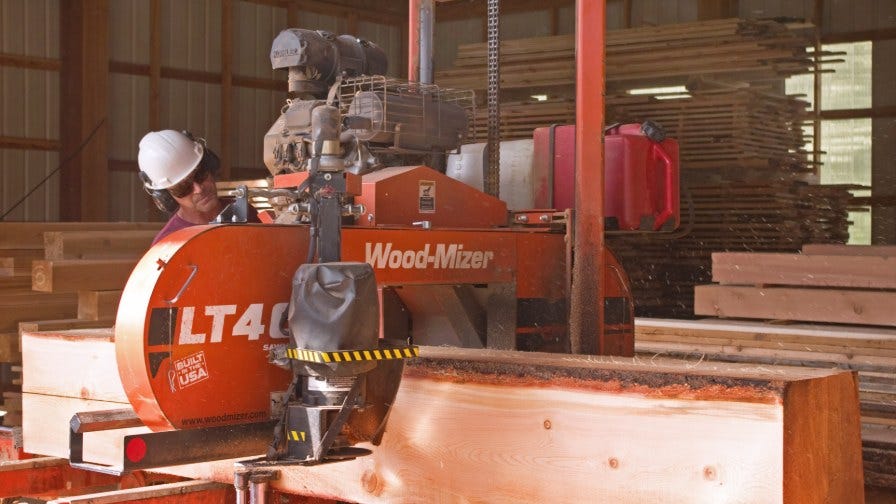
The bandsaw mill can saw logs up to 36" in diameter and up to 21' in length. With the ability to saw products up to that length, Nick likes to start with longer logs in the yard that he can then carefully buck with the goal of efficiently removing defects and producing wood products in a variety of popular lengths up to 16' and even longer as required.

Cedar timbers are available in sizes as large at 8" x 8" or as small as 4" x 4", which are popular for fence posts and railing, given cedar's natural resistance to moisture. Other outdoor applications for rough cedar wood products includes siding, fascia and decking. "Actually in its rough form, the cedar stands up better in the sun and accepts more stain," says Nick.
Overall, he focuses on common timber and lumber dimensions that are ready to use because these products move the fastest from inventory. Nick says that his LT40 Hydraulic portable sawmill is ideal for his type of business. "A bandsaw mill is the best tool for this type of business because you can just slice and dice whatever you want out of big timbers," says Nick. He aims to produce about 1,000 board feet per day, but it all depends on orders. He can fill an order within a week or less. Typically, he will saw timbers on a just-in-time basis to maintain their quality and use sideboards to fill his inventory.

This particular bandsaw mill comes equipped with a number of features to assist with log management and sawing accuracy. "This sawmill has the Accuset system so when I cut my boards, I can program it and just let it work," says Nick. This feature is an upgrade from his previous Wood-Mizer and he says that it was really easy to learn. "All those sideboards that I saw from my beams are super accurate and high quality material," he says.
Nick uses the standard Wood-Mizer sawmill blade that comes with the bandsaw mill, which is with a 1/8" kerf. Generally, he's careful with how long he uses sawmill blades before sharpening and setting them again on his automated Wood-Mizer sawmill blade sharpening system, typically changing a blade every hour. He uses up to seven sawmill blades a day during a full day of production. Given his experience using the Wood-Mizer sawmill, he can sense when a blade is struggling to perform at optimum. It takes him about a half hour to sharpen and set seven sawmill blades.
Nick says that he is pleased with the performance of his Wood-Mizer portable sawmill, and that it was an easy transition from his old model to his new one. Parts supply and sales support is handy from the Wood-Mizer dealer located in Salmon Arm, British Columbia.

